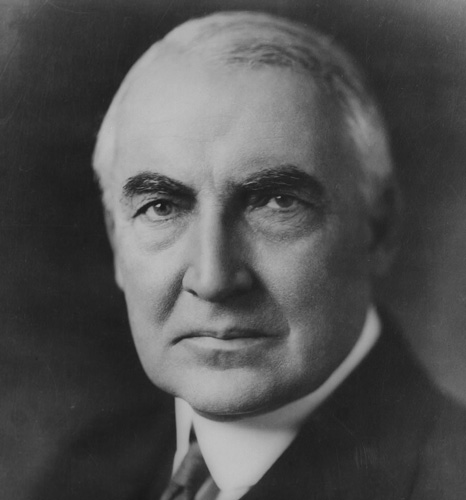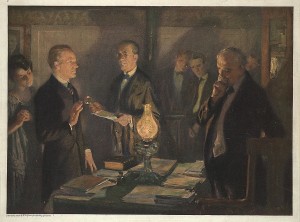The Republican convention of 1920 knew that the party was heavily favored to win the fall election. Wilson was forlornly hoping for third term nomination in spite of his crippled state as a result of the stroke. Teddy Roosevelt had died in 1919 at the age of 60. The contenders on the Republican side included Illinois Governor Frank Lowden whose only major handicap with the voters was the fact the he had married the daughter of George Pullman, the railroad tycoon, and was rather ostentatious in displaying his wealth. He had, however, been a reform governor of Illinois. General Leonard Wood, who had been a medical officer commissioned into the regular army in 1886 as a line officer, was another. He had been the senior officer of the US Army in 1917, yet President Wilson had appointed John J. Pershing, junior to Wood, to the European command. Wilson considered Wood a potential political rival, somewhat like Harry Truman and Franklin Roosevelt considered General MacArthur.
The third contender was Hiram Johnson, who had run as Teddy Roosevelt’s VP candidate on the Progressive ticket in 1912. There was little enthusiasm for him except among former Progressives who had returned to the party for 1920. Warren Harding is often described as a dark horse who was selected by party bosses after the leaders had exhausted each other. In fact, he was always in the top four and his selection was not a surprise to the convention.
The huge surprise was the nomination of Coolidge for Vice-President. He did not seek the nomination and was not interested after his experience as lieutenant governor of Massachusetts. After the Boston Police Strike, his name was familiar to the nation and in a favorable way. A big issue was the League of Nations and Coolidge favored membership, although with the Lodge reservations. Senator Lodge, no ally of Coolidge, exchanged letters with him on the League and agreed to disagree. Nevertheless, Lodge offered to place Coolidge’s name in nomination for President. Why he made the offer is not know. After several very favorable newspaper profiles appeared in early 1920, Coolidge made another statement that he was not a candidate for President. Frank Stearns and Lodge tried to bring a Coolidge delegation to the convention but Wood lived in Massachusetts and the delegation split. His interest in the nomination was further diminished by the death of his beloved step-mother, Carrie in May 1920.
Lowden’s handlers favored Coolidge as a VP candidate as he and the governor were from different parts of the country. Lowden’s biggest problem with the bosses was his reputation as incorruptible. The Illinois party bosses distrusted him. They feared he couldn’t be bought, or if so, wouldn’t stay bought. Robert Sobel, in his biography of Coolidge, says that Lowden was probably the best qualified Republican of the 1920s. One of the party bosses, Boies Penrose, asked Harding if he wanted to be president. Harding liked being a Senator and declined, leading Penrose to look elsewhere. By the time of the convention, Penrose was fatally ill, although his reputation was still powerful. He awakened from a coma during the convention, asked about the voting and suggested they choose Harding. Then, he lapsed into the coma again.

Read more

